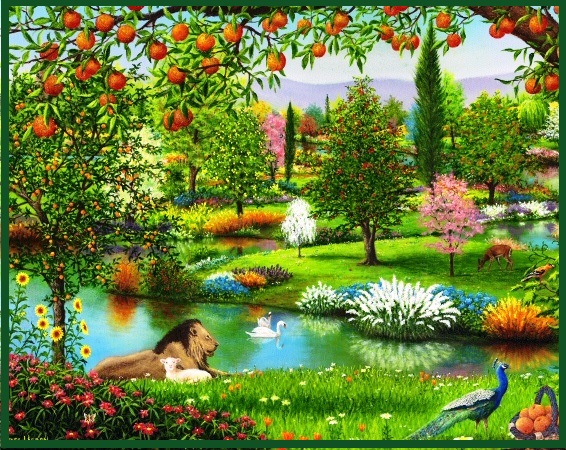Sabbath School Lesson for March 26-April 1, 2022
Lesson 1 Overview
The Creation story as found in Genesis 1 and 2 brings to mind several important themes. It teaches us about…
- our Creator (Sunday)
- the Creation being “good” (Monday)
- the significance of the Sabbath, the end of Creation week (Tuesday)
- humans created “in the image of God” (Wednesday)
- the responsibilities and privileges given to the first human pair (Thursday)
So much about God is revealed in the story of Creation at the very beginning of Moses’ writings. Genesis introduces us to Jesus, who John recognized as the Creator, as well as our Redeemer (John 1:1-4).
We discover that the stories in Genesis uphold the Person of Jesus, as much as any other book of the Bible. And we see this happening, right from the beginning of Moses’ account of how the world came into being.
Chapter 1 is a rapid-fire listing of God’s accomplishments on each day of Creation, revealing the power and majesty of this Supreme Being. It’s followed in chapter 2 with a more detailed description of how mankind fit into this newly created environment, built just for him.
To memorize: “In the beginning God created the heavens and the earth.” Genesis 1:1 NKJV
As we get into later stories about various people and events in Genesis, it’s obvious that this Creation account is more than a myth or legend. There’s no reason to believe it doesn’t have the same historical veracity as the other stories that are presented in Moses’ writings, which are often upheld and quoted later by various prophets, including Jesus Himself.
Sunday: The God of Creation
There are actually two accounts of the events of Creation at the beginning of Genesis:
- The first chapter shows us a God who is strong and majestic. The name Elohim embodies this powerful, awesome Creator, who methodically created a beautiful world in six days, declaring each day “good”.
- The second chapter slows down and gives us more details about our relationship with this “YHWH”, as He’s known in this chapter. We are made aware of His closeness, as He breathed into the nostrils of Adam and gave him life. Both Adam and Eve were made in God’s image, tenderly molded to be like Him.
These two views of God portray how we should approach Him. We come to Him in awe and with reverent obedience, but also with joyful, trusting praise for His mercy and love. This is why Genesis reveals both our Creator and our Redeemer.
Discussion Questions:
Psalm 100:1-3
- How should we approach God?
- What does the Creation story have to do with our worship of God?
Psalm 95:1-6
- Why are singing and kneeling part of our worship service?
- For what reasons do we worship God with joy and thanksgiving?
Psalm 139:13, 14 and Revelation 14:7
- What part of the Creation story should draw us closer to God?
- How do we worship God as our Judge?
- What does it mean to “fear God”?
Monday: The Creation
Looking at Genesis, chapter 1, we see the Hebrew word tov, or “good”, used after each day of Creation. This word tells us many things:
- Each day’s work was successful. In other words, the light lit up the planet, the plants yielded fruit, etc.
- The work accomplished was beautiful. There was a perfect, aesthetic quality to it. It was pleasing to the senses.
- It was the opposite of evil, which is associated with death. In other words, it was a lively, life-producing enterprise.
The theory of evolution tells an opposite story. It proposes that the world began in an inferior condition and progressively shaped itself to a more superior one. All of this evolved, evolutionists tell us, as a result of accidental circumstances that occurred over a very long period of time.
This radically differs with the idea that a Superior Being was involved with the origin of our world, and all the worlds, for that matter. Hebrews 11:3 tells us that, by faith, we believe this to be true. There is no way to prove either theory, but many Bible scholars uphold the Genesis account to be just as plausible as the unproven concepts proposed by evolutionists.
With God as the Prime Mover of this operation, there is no reason to doubt that all the world was completed in one week, as Moses described. Our God, we feel, is indeed powerful enough to make it happen in that time frame, if that was His will.
Discussion Questions:
Genesis 1:4, 1o, 12, 18, 21, 25, 31
- What was “good” about each day of Creation? In what ways was it “good”?
Tuesday: The Sabbath
Genesis 2 begins the second account of Creation, which focuses on man’s place in the process of creating this beautiful world. One of God’s first gifts was to bless the holy pair with a day of rest, which allowed them to leisurely associate with each other and grow their relationships. The Sabbath must have felt like their honeymoon with God.
This seventh-day Sabbath was established in the Garden, and later on Mount Sinai, to give them a consistent time to pause and appreciate God’s handiwork, including that of their own bodies (Psalm 139:14). They were given the opportunity to enjoy creation and the reason they were to care for it.
After the Fall, the Sabbath was a hopeful sign that someday a miraculous new creation would allow them to once again enjoy that same closeness with their Maker. See Isaiah 65:17 and Revelation 21:1.
Jesus healed many times on the Sabbath to draw them away from their harmful, Sabbathkeeping traditions. These Sabbath healings were to indicate that someday all their pain and suffering would be over. Each Sabbath should point us to that hope of redemption. It is a sign reaching to the past, but also to the future.
Discussion Questions:
Genesis 2:1-3
- What did God’s rest look like? Was He tired?
- Why did God bless the seventh day? Why did it need to be blessed?
Exodus 20:8-11 and Deuteronomy 5:12-15
- What significance is there in the commandment language being so similar to the Genesis account?
- How was Sabbath observance affected by the Fall of Adam and Eve?
Wednesday: The Creation of Humanity
Genesis 1:26 says that mankind was made in His image, according to His likeness. The Hebrew word for “image” refers to the physical, concrete elements of humans–their actual shape and form. And the Hebrew word for “likeness” includes the more abstract, spiritual nature of God. Many times we forget the wholistic way we were created to be like God. Ellen G. White tells us in the book Education, p. 15, “When Adam came from the Creator’s hand, he bore, in his physical, mental, and spiritual nature, a likeness to his Maker.”
In Genesis 2:7 we notice that God breathed into Adam’s nostrils “the breath of life”. Breath has often been interpreted as something spiritual (you can’t see it), and life as something physical (you notice when something is alive).
The way Eve was created, directly from Adam’s side, indicates that she also bears the image of God (Genesis 2:21, 22). As a matter of fact, she no doubt completed this image in a way Adam could not have done on His own. Adam recognized this deficiency in himself as he was naming all the animals. He felt the need for a “helper” comparable to him.
The careful, meticulous work of creating humans was the final crowning act of God on the sixth day of Creation week. The natural world was ready to receive the holy pair. Their lovely Eden home was totally furnished and ready for occupancy. They were prepared for God to give them the keys and carry them over the threshold on the first Sabbath.
Discussion Questions:
Genesis 1: 26, 27 and 2:7 and Psalm 139:14
- What does it mean to you that you were created in God’s image?
Genesis 2:20-24
- What makes us think that Eve was also created in God’s image and likeness?
- What does this tell us about the nature of God?
Thursday: The Duty of Humanity
Adam and Eve were blessed with three gifts from God that contained a responsibility, allowing them to interact with God in a positive way to reinforce their relationship of love and trust with each other.
- The beautiful Garden home they found themselves in was a gift, but it required them to tend, or look after it (Genesis 2:8, 15).
- Fruit-bearing trees contained all the food they would require to sustain their bodies in the most healthy and satisfying way. But they were to stay away from one tree, the tree of the knowledge of good and evil, if they were to remain alive and well (Genesis 2:16, 17).
- Their third gift was to have each other as husband and wife. The gift of human interaction through marriage came with certain restrictions, however. For example, the need to leave one’s parents to live with their spouse was recommended as the best way to blend their lives together in a way that would make them one flesh, or one person (Genesis 2:24).
Down through the ages, we’ve come to recognize these gifts of God in ways that are particular to our situations. Having a home, food to eat, and friends and family around us are still the greatest blessings for which we are thankful.
But we do have a duty and a choice to use these gifts in the best way possible. Maintaining our house by making it comfortable and attractive is not only a privilege, but our duty. Choosing the best foods to eat is necessary if our bodies are to keep functioning as they should. And finally, seeking to remain friendly and personable with those around us ensures healthy relationships that bless our lives.
Discussion Questions:
Genesis 2:8, 15
- How are we responsible for where we live?
Genesis 2:16, 17
- Why does it matter what food we eat today?
- Why is diet such a hard thing to conquer?
Genesis 2:24
- What other responsibilities do married people have with each other?
- Why is it important to have interactions and relationships with other people?
- What are some ways we can stay involved with people, when a pandemic keeps us home more to keep our communities safe?
Friday: Final Thoughts
Mankind has always had a tendency to worship the creature rather than the Creator, as Paul pointed out in Romans 1:25. Many of the idols worshiped in the ancient world were animals, birds, or insects. Then the scientific world proposed the theory of evolution, once again turning the focus of attention to the creature, and ignoring God’s involvement entirely.
Even today, we find it easy to allow our concern for the environment, or even pursuing natural, healthful lifestyles, to absorb and replace our love for God. Either that, or we are so in love with our material possessions that our love for Him is diminished or gone entirely.
The study of Creation definitely has a permanent place in our lives, with one day of the week given to us as an opportunity to know God in the most balanced, helpful way possible. Let’s use the Sabbath for this purpose. Seeing it as a day to celebrate creation and redemption will help us benefit most from the many God-given blessings we enjoy.
Thinking about Creation, we long to sing “How Great Thou Art”—https://www.youtube.com/watch?v=3GKhDCsLrUg
Next Week: The Fall
To read the Sabbath School Lesson Quarterly or see more resources for its study, go to








